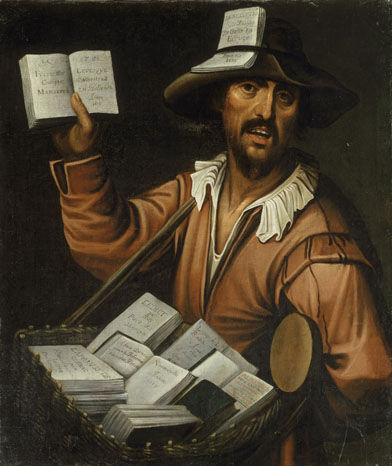Fr : version française / En: english version
Colporteurs
Many traders were not so well-off: these were the colporteurs (peddlers) who carried their wares on their backs and vaunted the merits of their merchandise in a loud voice to attract patrons.
Persecuting the peddlers
Informers had a habit of targeting the colporteurs, the people selling the only books still worth reading in France, and banned as a result. They were horribly treated; every police informant was out to hunt down the poor peddlers, who had no idea what they were selling, and would even hide The Bible under their coats if the Lieutenant de Police dared to forbid the Holy Book. The unfortunate were locked up in the Bastille prison for selling futile pamphlets that would quickly be forgotten, and were sometimes made to wear an iron collar.
Postmen given the task of weeding out such publications often made extra money on the side by distributing them to a select few, single handedly earning more than 30 colporteurs.
Extract from Louis-Sébastien Mercier's Tableaux de Paris, 1783. (Free translation from the French)
Hawkers of books and literature enjoyed great success by selling the Bibliothèque Bleue, the precursor to modern-day easy-reading material typically found in airports. However, the authorities were suspicious of these vendors, since they also were liable to sell pamphlets mocking the incumbent government; the trade was therefore strictly monitored.



























